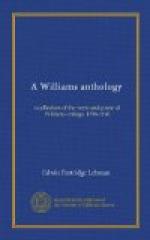There are themes which no man can cope with. There are times when those ordinarily confident shrink back at the thought of grappling with the mighty issues that lie before them. There are minds of a structure so singularly complex and unique, that one leaves the study of them impressed only with a deep, abiding sense of his inability to fathom them. We have in our midst one such, the penetration of whose manifestations and phenomena is well calculated to baffle the most zealous investigator. Reared among the rugged hill-sides and verdant vales of Williamstown, his character and oratory bear the evident impress of his nurturing. If to Elihu Burritt belongs the title of “The Learned Blacksmith,” not less to William Pratt is due that of “The Eloquent Wood-sawyer.” Though he cannot, like Elihu, claim a knowledge of eight languages, he can at least use the one of which he is master, in a manner at once astounding and gratifying. No son of Williams needs to be told who he is; yet for the benefit of those unacquainted with his genius and oratorical ability, we will endeavor briefly to sketch his early career before enlarging upon the grander triumphs of his later years.
The subject of the present article was born not far from the year 1810. Whether or no any comet or other unusual heavenly phenomenon heralded his entrance upon the scenes of earth, is not recorded. If, however, the astronomical appearances which are said to accompany the birth of the mighty ones of the sons of earth are gauged with any degree of fairness, there should have been at least six large comets and any number of meteors distinctly visible. His early life glided by gently as the placid Hoosick, by which he frolicked. Several desperate attempts were made by various misguided individuals to educate him. From all these, however, he escaped unscathed, with the wings of his genius unfettered. At what precise period he began to exhibit symptoms of that highly original and forcible eloquence which he now possesses, we are unable to state. We presume that his first efforts were co-existent with the commencement of his career as a wood-sawyer. Certainly, at present, he is rarely filled with the divine afflatus except when plying his saw. He is unlike Shakespeare, as he often repeats. One utterance—“Ottah”—the coinage of his own brain, seems to be the attempt of his daring and unschooled genius to strike out not only into new lines of thought, but even to find a mystic mode of expression. This term is evidently a portion of a language wholly differing from our own. It is at once a noun, adjective, and verb, and, in the full flood of his eloquence, it changes from the one to the other with astounding rapidity.
The extreme versatility of his genius renders it peculiarly difficult to give any adequate idea of his oratory. He is equally bold in the expression of his sentiments on any subject. Perhaps for convenience in consideration we may roughly divide his oratory into wood-pile and conversational eloquence.




